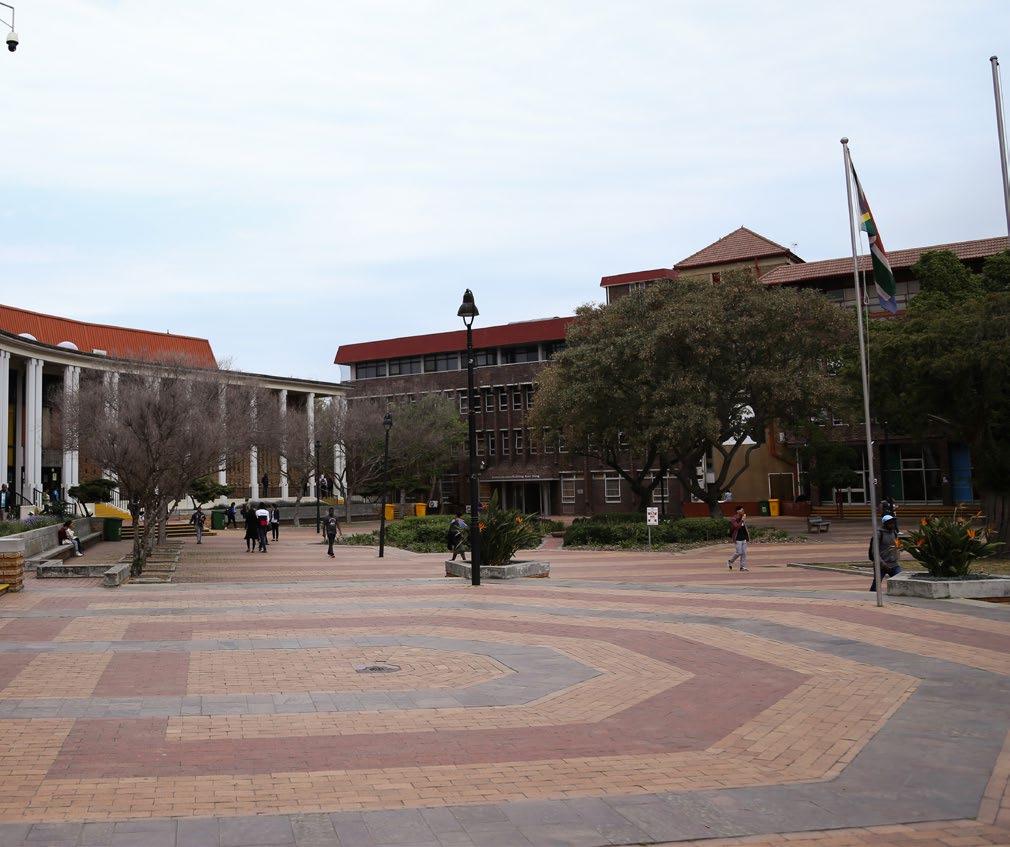
4 minute read
Preface
It gives me great pleasure to release our first Scholarship of Engagement Report at the University of the Western Cape (UWC). UWC has always been a place where community engagement comes naturally for staff and students alike. It, therefore, came as no surprise when it came out strongly as being “in our DNA” in the series of “Courageous Conversations with Alumni” that I hosted in 2017 and 2018.
At UWC we do not follow “a soup kitchen approach” to community engagement, but a clear integrated form of scholarship of community engagement that links community engagement with learning and teaching and/or research. This approach was affirmed at one of our Community Engagement colloquia which we host annually, through our Community Engagement Unit, under the leadership of Prof Daniels.
As part of us striving to acknowledge and recognise the scholarship of engagement, we have Community Engagement Excellence Awards for individuals and teams at our annual Academic Achievers’ Awards ceremony. In addition, the integrated scholarship of community engagement is an integral part of our criteria for academic promotions. This Report takes our efforts further, by recognising the research conducted at UWC by engaged scholars, as evidence of our impact on our communities and society. Thanks to Prof Daniels, Ms Pearl September-Brown and team for the hard work and effort that went into compiling our first Scholarship of Engagement Report. Congratulations to all our colleagues at UWC whose research is featured. Together with our communities, we as UWC will continue to co- create knowledge that have a sustained impact on our communities and society.
Prof vivienne lawack
Deputy Vice-Chancellor: Academic


intrODuctiOn

In 2019 the Corona virus heralded its devastating impact on the world. Governments and their economic health and educational institutions were faced with making impossible choices in their efforts to save lives. Public Health interventions were pushed to the forefront and the virus reminded us how closely interconnected we all are, nationally, regionally and globally. Although large parts of South Africa and the world closed down many initiatives around the world including SA universities sought vaccines and effective public health responses. Our history of involvement in the liberation struggle informs our CE response to our current crisis and we continue to prioritise the community’s perspective of desired change.
Social innovations are new solutions such as products, models and processes that can meet a social need more effectively than existing solutions while simultaneously empowering and building relationships with the community and using resources appropriately (Social Innovation Community, 2020). “Social innovations are both good for society and enhance society’s capacity to act.” (Social Innovation Community, 2020). Local innovation in South Africa is very often initiated “to solve local problems and challenges and thereby improve the livelihoods and standards of living’’, and yet not usually supported by large national programmes (Ndabeni, et al., 2016, p. 305). However inclusive innovation needs to harness indigenous knowledge for innovation to occur within communities (Ndabeni, et al., 2016). Effective innovation policies are reliant on the quality of local institutions, which depends on “control of corruption, rule of law, government effectiveness and government accountability” (RodriguezPose et al., 2015, p.692). Unfortunately, the South African government has been lacking in controlling corruption, transparency and good governance (Rogerson, 2014). For innovation to be realised national and local policy need to support and encourage the exploration of indigenous knowledge (Ndabeni, et al., 2016).
In order for this to occur appropriate policy and instruments need to be developed to assist with objectives such as self-reliance, community development, which are based on appropriate assessments of local contextual needs, conditions, resources, skills, constraints and opportunities (Ndabeni, et al., 2016). It is crucial that we understand how innovation occurs and whether that type of innovation would be suited and supported by the community. Finally we need to evaluate how and from where knowledge is accessed for the purpose of innovation, who develops it, and which agencies support innovative projects (Ndabeni, et al., 2016).
“Community-led social innovation is driven by the belief that the wisdom to solve intractable social problems lies within the community” (Singhal, 2010. as cited in Domanski et al., 2017, p. 149).
SchOlarShiP Of engagement at uwc
The Community Engagement Unit (CEU) facilitates community engagement opportunities that enhances and promotes the scholarship of engagement through equitable partnership and citizenry to promote sustainable communities. The scholarship of engagement embraces a critical attitude towards shared knowledge that recognises different cultural contexts and diversity and incorporates these aspects into community engagement teaching, theory and practice, integration and research.
Boyer (1996) argued that US universities should return to searching for answers to the most pressing problems of a social, civic economic and moral nature. Boyer who died in 1995 is the leading theorist of community engagement and its scholarship. Boyer’s scholarship of engagement not only desired an equitable relationship between university and community but rather a larger role in guiding the nation and providing a refuge for those who had been negatively impacted by wars or racism. He comments on the affirmative actions in the 1960’s by almost every university to recruit historically excluded students and after the second World War universities provided safe harbour for veterans through the GI Bill (Boyer, 1996). UWC for example provided employment for activists and enrolled students despite government










